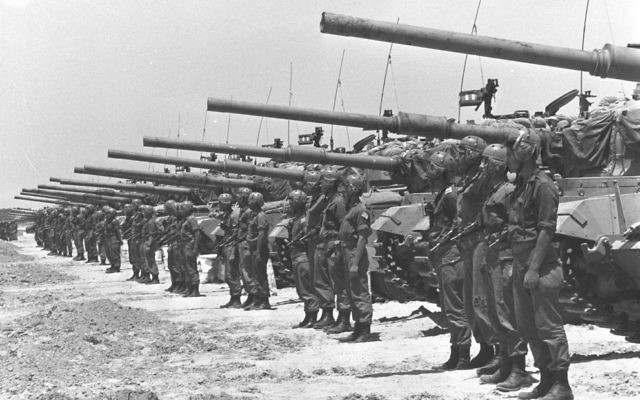Six days that changed the world
HALF a century after Egyptian, Jordanian and Syrian forces threatened to annihilate Israel, only to be roundly defeated by the IDF, community leaders in Australia have reflected on the tension and triumph that engulfed Israel and the entire Jewish world during the Six-Day War.
HALF a century after Egyptian, Jordanian and Syrian forces threatened to annihilate Israel, only to be roundly defeated by the IDF, community leaders in Australia have reflected on the tension and triumph that engulfed Israel and the entire Jewish world during the Six-Day War.
Speaking ahead of the conflict’s 50th anniversary next week, Executive Council of Australian Jewry president Anton Block recalled that “when Israel’s neighbours massed their armies on its borders, ejected UN peacekeepers and exultantly proclaimed Israel’s imminent demise, the world held its breath and wondered whether a mere two million Jews in Israel could stand up to the coming onslaught.
“By the grace of God and through the determination of its people and the brilliance of the IDF, Israel defied the odds and, after six days, won a decisive victory over its Arab foes and returned the Old City of Jerusalem and the Temple Mount to Jewish sovereignty for the first time in two millennia,” he said.
“In September 1993 on the White House lawn, upon signing the Israeli-Palestinian Declaration of Principles, Israel’s prime minister Yitzhak Rabin declared that ‘the time for peace has come’. We all willed it to be true, but it was not to be. Since then Israel has had to defend herself many times both on the battlefield and in the political arena,” Block stated.
Australia/Israel & Jewish Affairs Council executive director Colin Rubenstein said the 1967 war “was in many ways a sequel of the Independence War … it was the product of the refusal of the Arab world to accept Israel’s right to exist.
“Yet since then, many have come to place Israel’s presence in the West Bank as a result of the 1967 war as the root cause of the conflict. This ignores not only what happened before 1967, when Egypt controlled Gaza and Jordan annexed the West Bank, but the fact that Palestinian leaders have since rejected out of hand at least three far-ranging peace offers from Israel that would have given Palestinians a state in virtually all of the West Bank and Gaza,” Rubenstein said.
“Since 1967, two out of three of Israel’s neighbours directly involved in the war, Egypt and Jordan, have made the difficult decision to make the necessary compromises to accept Israel and make peace with her,” he said.
“Fifty years after the Six-Day War, it’s high time that Palestinian leaders, potentially with the encouragement of the Arab Sunni world and an engaged US president, follow in their footsteps,” he continued.
Speaking from Israel, Zionist Federation of Australia president Danny Lamm, who attended Yom Yerushalayim celebrations at the Kotel, described the Shacharit service as “one of the most uplifting experiences of my life. The day concluded with the flag raising march from central Jerusalem to the Damascus Gate and on to the Kotel. The atmosphere was electric”.
“The Six-Day War saw the reunification of all of Israel with our return to Judea, Samaria, Gaza and the Golan Heights. We recovered old Jerusalem, Hebron, Bethlehem and Shechem, and the holy sites of the Kotel, Ma’arat hamachpela, Kever Rachel and Joseph’s Tomb. We reunited the Hadassah Hospital of Mount Scopus with that in Ein Kerem, the Hebrew University campuses at Mount Scopus and Givat Ram. We controlled the mountain heights and the Jordan valley,” he said.
Lamm harked back to IDF Lieutenant-General Mordechai ‘Motta’ Gur’s famous cry, “Har Habayit b’yadeinu (the Temple Mount is in our hands)”, describing it as “a rallying call to our people in Israel and the Diaspora, a clarion announcement to the entire world that the Jewish people are back and are the decisors of their own future”.
PETER KOHN
Full anniversary coverage in this week’s AJN.


comments